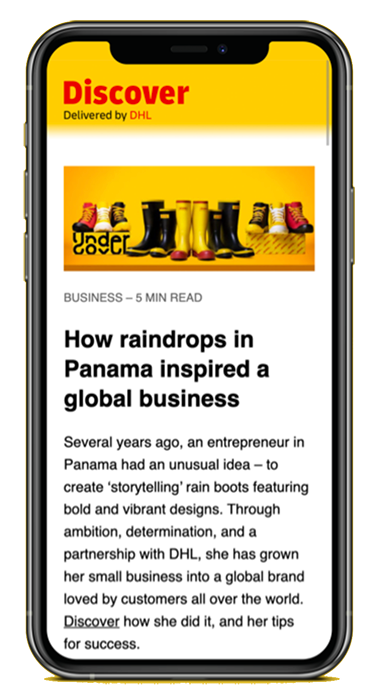Grow your business with the Discover newsletter
Logistics advice & insights straight to your inbox
Subscribe now
Every business faces numerous uncertainties that bring about a varied range of consequences. However, the mere establishment of structures and processes often suffice in reducing uncertainty and managing possible risks. While uncertainty abounds and even the most experienced of leaders have no ability to decipher what the future will bring, the uncertainty brought forth by the risk of a global recession in 2023, political unrest, and the like has become a theme keeping most businesses busy today. Therefore, to continue achieving sustainable growth and to stay afloat, it is pivotal for businesses to prepare for the unexpected in the most innovative ways. But how can you be better prepared for a future that remains highly uncertain?
By definition, business uncertainty refers to instances in which organisations face risks where the outcomes cannot be foreseen or measured. Being left in the dark in these circumstances, it can be challenging for businesses to accurately forecast their performance. Be it due to an unprecedented change of events or simply not having sufficient information to navigate a situation, no matter how hard businesses attempt to make predictions, the reality of their standing is something that they cannot have a bearing on. Some of these so-called uncertainties can be changes in the political landscape, technological advances, shifts in consumer behaviour, new business regulations or even natural disasters.
Uncertainty in business can be categorised into four types — level one, two, three and four — and these are all dependent on the degree of uncertainty. Level one is where a predictable future of the company’s performance can be forecasted and a strategy can still be made based on simple simulations. This slowly escalates to level four, which is known as true uncertainty. While rare, it is a type of business uncertainty where future outcomes cannot be predicted at all since even the most thorough of analysis will not lead to an accurate determination of an outcome. One classic example of this type of uncertainty is the impact of the pandemic that the travel industry faced.
In recent years, the global landscape has shifted tremendously, causing many organisations to face uncertainty in their business dealings. The likes of political and social affairs have made it difficult for business owners to move forward with their entrepreneurial and business matters.
There is no one certain factor that causes uncertainty in business, but rather a plethora of elements coming together to make an impact. Whether they’re events that have a negative effect on the world, such as natural disasters, or even positive circumstances, such as updated business rules and regulations, any factor that causes a change in the business environment can cause uncertainty.
For example, from the end of 2020 to the start of 2021 when the pandemic had a firm grip on all businesses, The World Bank reported that 25% of companies around the world saw sales fall by half and 11% of companies had to lay off their employees.
In Malaysia, when the government implemented the Movement Control Order (MCO), nearly 68% of business firms saw a complete lack of revenue, forcing them to tap into their savings to accommodate operating costs and working capital. A staggering 42.5% of Malaysian businesses also had to take six months or more to recover from the global catastrophe, revealed the Department of Statistics.
Political factors can also affect businesses. In Malaysia, this was reflected in the resignation of the prime minister, Mr. Muhyiddin Yassin, in 2021. This impacted the country’s economic recovery from the pandemic, showing that the effects of economic uncertainty can be brought about by political factors too.
However, there are a variety of ways in which a business can make themselves more flexible to deal with uncertainty and a few globally-known businesses have implemented approaches perfectly.


The popular global titan in soda beverage production has stayed at the top of the game for a reason. However, in the 1980s, Coca-Cola’s new product launch spelt disaster for the brand. Quickly coming to grips with managing the uncertainty of how consumers reacted to the new formula, the company changed the recipe of the newly-released drink and responded to consumer demands to maintain its appeal. Coca-Cola has maintained that degree of flexibility in its products since, releasing Coke Zero and Diet Coke to cater to the ever-changing demands. From this, it’s clear to see that building flexibility and embracing change is key to dealing with uncertainty in a business environment.

There is no fool-proof measure to implement that will make your business impervious to all external factors and uncertainty. However, there are a few approaches that could help you better cope with uncertainty in the business environment.
E-Commerce and digital platforms are the modern forms of human consumption. Be it retail, or entertainment, there is bound to be a digital platform that suits your needs. Businesses that were able to function successfully during the global pandemic had a digital platform that could supplement their traditional sales model.
There are few products that will forever maintain their appeal to a global audience. But with the dramatic rise and fall of trends, once popular products eventually lose their value. Ask any business owner to share the best way to improve customer retention despite these shifts, and diversifying your business portfolio will be the main answer.
One classic example that demonstrates the importance of this is that of Nokia. Once a popular phone owned by many, it was taken over by the smartphone industry which had unique offerings. Nokia fell into a period of economic uncertainty, but eventually branched out into the technology sector, quickly buying Siemens and Alcatel-Lucent. Through this move, Nokia was able to use the demographics of these established companies to build their own new target demographic in the technology space, keeping themselves relevant.
And finally, partnering with a reliable logistics partner will allow your business to optimise delivery processes and stay a step ahead regardless of the uncertainty in the global environment. Beyond the timely fulfilment in a highly competitive marketplace, an ideal logistics partner will allow your business to efficiently leverage the RCEP. With markets kept open between countries and multilateral trading systems being strengthened, all that is required is a logistics partner that will handle your supply chain.
By establishing a strong partnership with a leader in the logistics industry who understands how major of a factor uncertainty in business can be, you will gain access to the tools necessary to make your business relevant in a changing society. Fulfilling all the basics such as handling shipments from Malaysia to Singapore and beyond, a reliable courier service provider can help take a weight off your shoulders as you navigate the uncertain changes of your business environment.